Abstract
OBJECTIVE: To raise compliance in a general practice based colorectal cancer screening programme by the use of a simple health educational leaflet. DESIGN: A randomised controlled trial of the leaflet's effect on completion of faecal occult blood tests. The leaflet explained the high frequency of colorectal cancer, the principles of screening, and addressed reasons for non-compliance. SETTING: The British town of Market Harborough where most of the population are registered with a single practice. PARTICIPANTS: These comprised 1571 residents aged 61 to 70 years registered with the practice. Residents were invited to receive a free faecal occult blood test in a colorectal cancer screening programme. Half the population were randomly assigned to receive the educational leaflet about screening. RESULTS: Compliance in test and control groups, positive rate of stool testing, and pathology detected were measured. Compliance was higher in men who received the leaflet in those aged 61 to 65 years (36% v 27%, chi2 = 4.0, p < 0.05) and in men aged 66 to 70 years (39% v 23%, chi2 = 9.7, p < 0.01). In women, use of the leaflet did not affect compliance in those aged either 61 to 65 years (38% v 36%, chi2 = 0.1, NS) or 66 to 70 years (31% v 31%, chi2 = 0.0, NS). The positive rate of stool testing in patients observing the required dietary restrictions was 1.6%. A significant lesion was detected in 1.4% of people tested (2 carcinomas and 5 patients with adenomatous polyps). CONCLUSIONS: Health education leaflets addressing reasons for non-compliance significantly increased compliance in men and should be used in screening programmes. Reasons for the lack of success of the leaflet in women should be investigated and other interventions for raising compliance should be developed.
Full text
PDF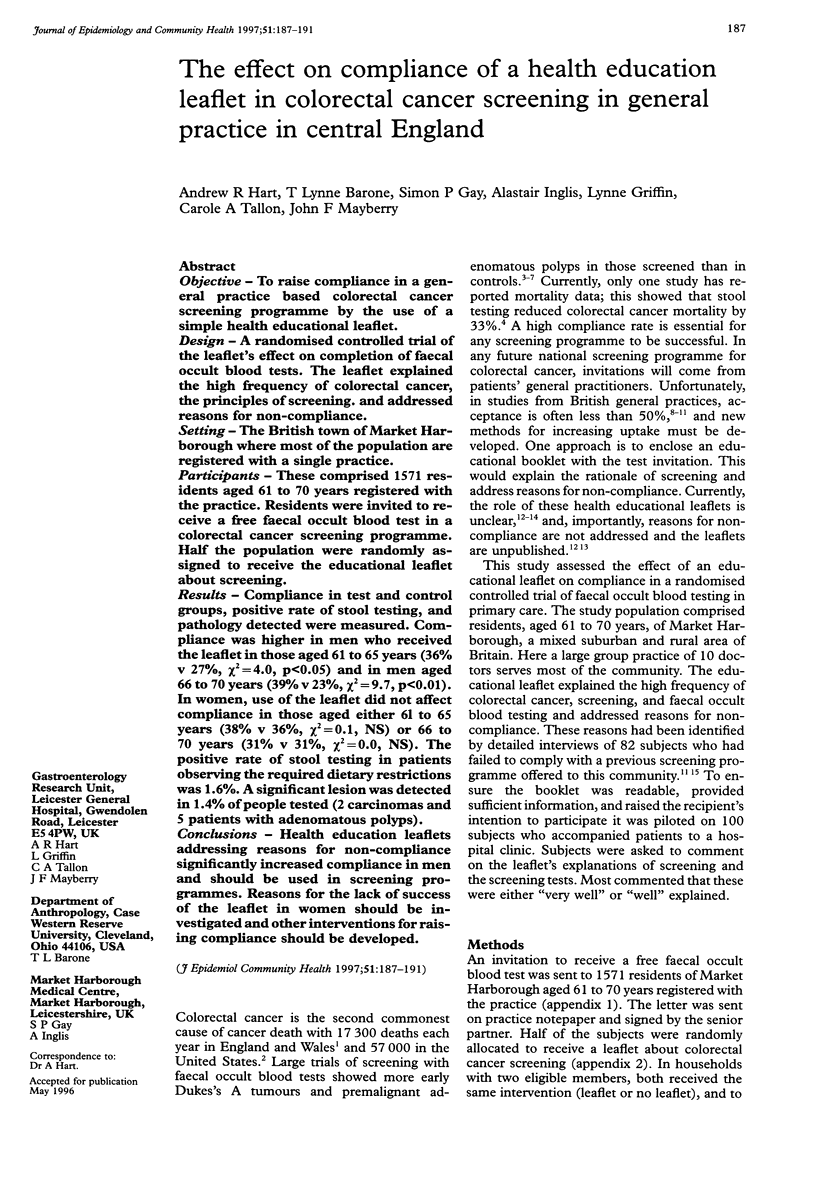
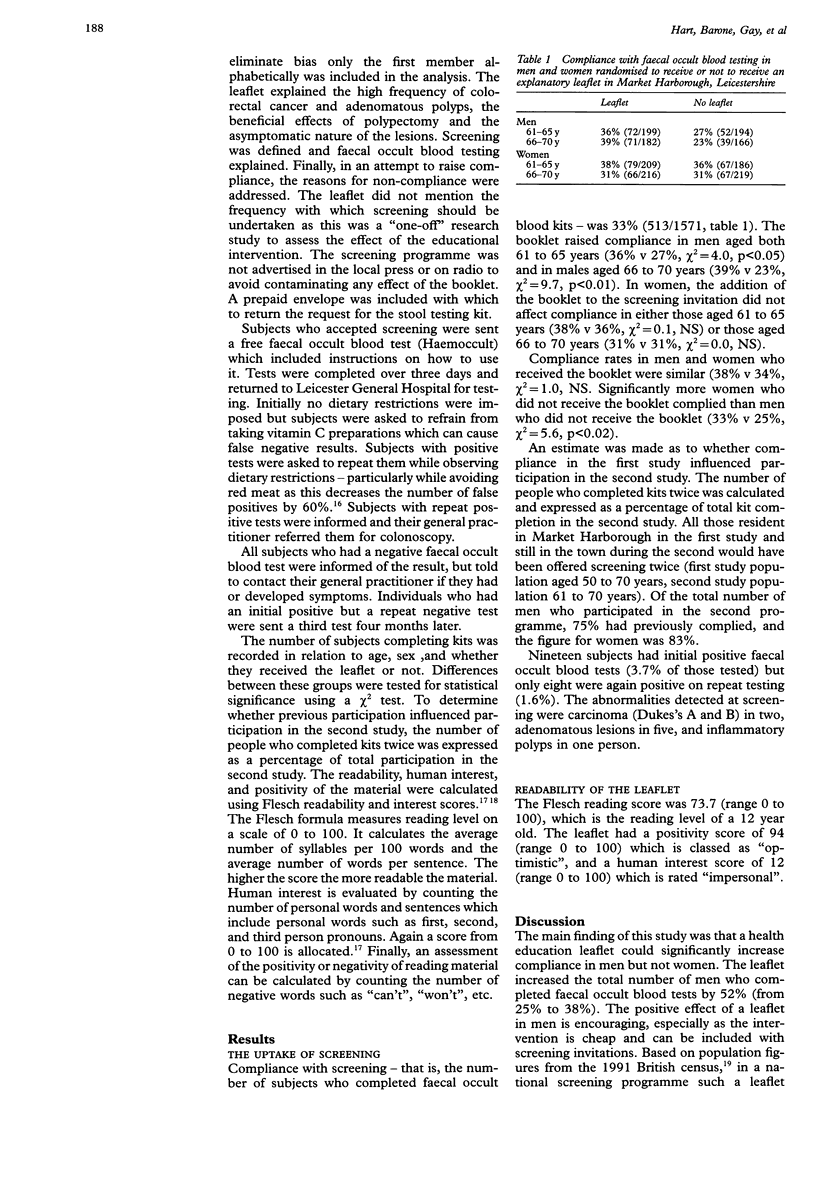
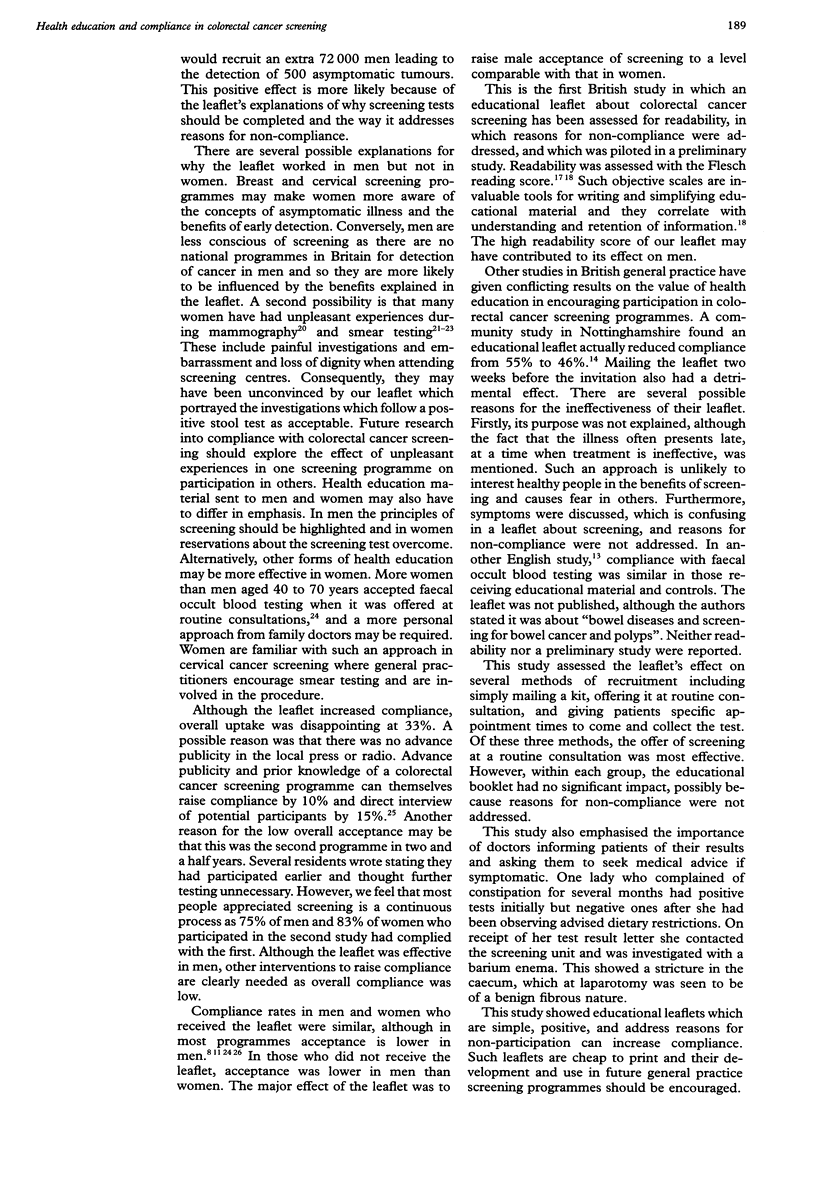
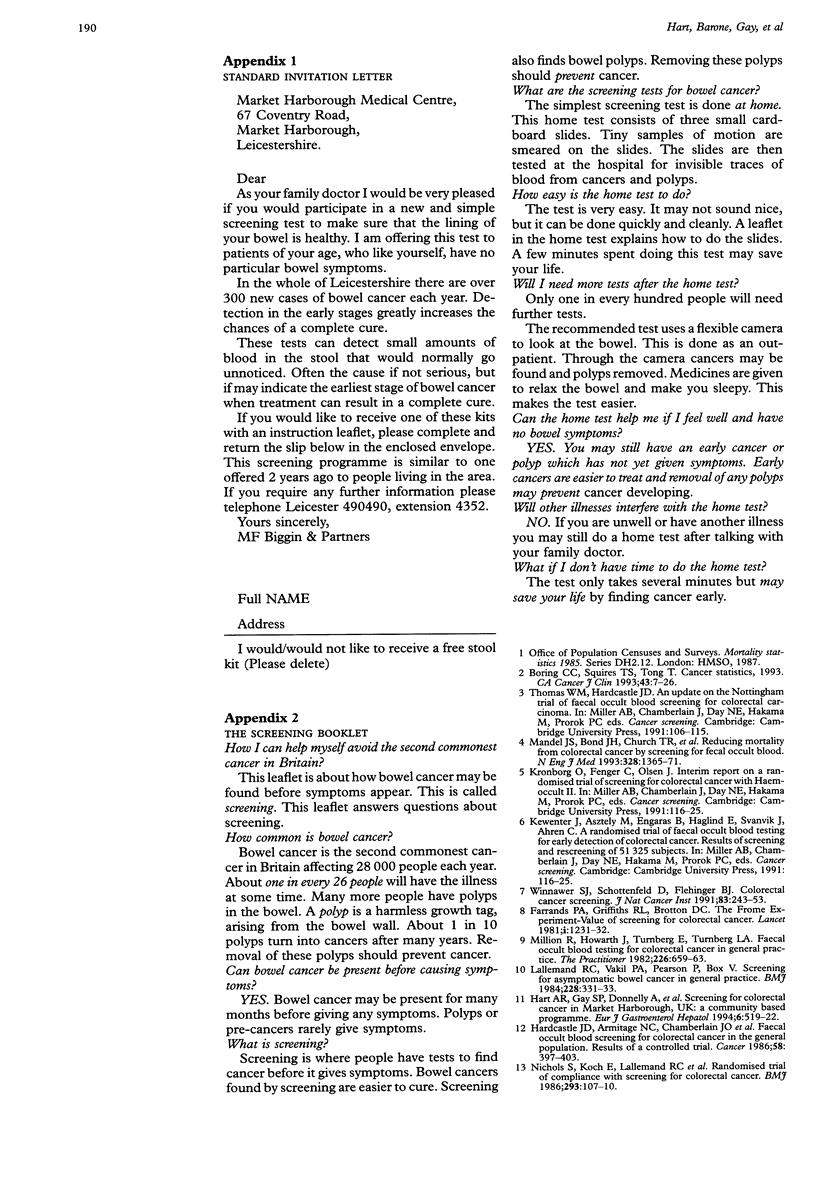
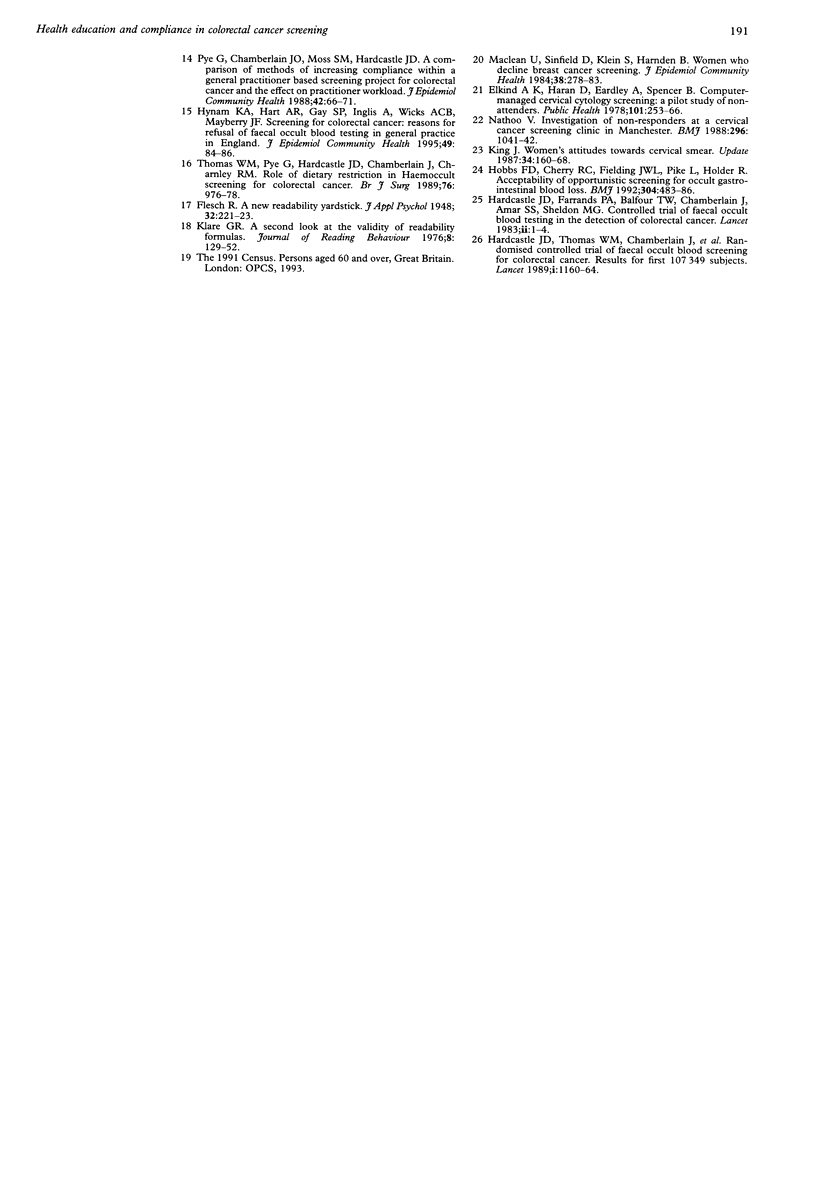
Selected References
These references are in PubMed. This may not be the complete list of references from this article.
- Boring C. C., Squires T. S., Tong T. Cancer statistics, 1993. CA Cancer J Clin. 1993 Jan-Feb;43(1):7–26. doi: 10.3322/canjclin.43.1.7. [DOI] [PubMed] [Google Scholar]
- Elkind A. K., Haran D., Eardley A., Spencer B. Computer-managed cervical cytology screening: a pilot study of non-attenders. Public Health. 1987 Jul;101(4):253–266. doi: 10.1016/s0033-3506(87)80076-8. [DOI] [PubMed] [Google Scholar]
- FLESCH R. A new readability yardstick. J Appl Psychol. 1948 Jun;32(3):221–233. doi: 10.1037/h0057532. [DOI] [PubMed] [Google Scholar]
- Farrands P. A., Griffiths R. L., Britton D. C. The Frome experiment--value of screening for colorectal cancer. Lancet. 1981 Jun 6;1(8232):1231–1232. doi: 10.1016/s0140-6736(81)92401-6. [DOI] [PubMed] [Google Scholar]
- Hardcastle J. D., Armitage N. C., Chamberlain J., Amar S. S., James P. D., Balfour T. W. Fecal occult blood screening for colorectal cancer in the general population. Results of a controlled trial. Cancer. 1986 Jul 15;58(2):397–403. doi: 10.1002/1097-0142(19860715)58:2<397::aid-cncr2820580235>3.0.co;2-x. [DOI] [PubMed] [Google Scholar]
- Hardcastle J. D., Farrands P. A., Balfour T. W., Chamberlain J., Amar S. S., Sheldon M. G. Controlled trial of faecal occult blood testing in the detection of colorectal cancer. Lancet. 1983 Jul 2;2(8340):1–4. doi: 10.1016/s0140-6736(83)90001-6. [DOI] [PubMed] [Google Scholar]
- Hardcastle J. D., Thomas W. M., Chamberlain J., Pye G., Sheffield J., James P. D., Balfour T. W., Amar S. S., Armitage N. C., Moss S. M. Randomised, controlled trial of faecal occult blood screening for colorectal cancer. Results for first 107,349 subjects. Lancet. 1989 May 27;1(8648):1160–1164. doi: 10.1016/s0140-6736(89)92750-5. [DOI] [PubMed] [Google Scholar]
- Hobbs F. D., Cherry R. C., Fielding J. W., Pike L., Holder R. Acceptability of opportunistic screening for occult gastrointestinal blood loss. BMJ. 1992 Feb 22;304(6825):483–486. doi: 10.1136/bmj.304.6825.483. [DOI] [PMC free article] [PubMed] [Google Scholar]
- Hynam K. A., Hart A. R., Gay S. P., Inglis A., Wicks A. C., Mayberry J. F. Screening for colorectal cancer: reasons for refusal of faecal occult blood testing in a general practice in England. J Epidemiol Community Health. 1995 Feb;49(1):84–86. doi: 10.1136/jech.49.1.84. [DOI] [PMC free article] [PubMed] [Google Scholar]
- Maclean U., Sinfield D., Klein S., Harnden B. Women who decline breast screening. J Epidemiol Community Health. 1984 Dec;38(4):278–283. doi: 10.1136/jech.38.4.278. [DOI] [PMC free article] [PubMed] [Google Scholar]
- Mandel J. S., Bond J. H., Church T. R., Snover D. C., Bradley G. M., Schuman L. M., Ederer F. Reducing mortality from colorectal cancer by screening for fecal occult blood. Minnesota Colon Cancer Control Study. N Engl J Med. 1993 May 13;328(19):1365–1371. doi: 10.1056/NEJM199305133281901. [DOI] [PubMed] [Google Scholar]
- Million R., Howarth J., Turnberg E., Turnberg L. A. Faecal occult blood testing for colorectal cancer in general practice. Practitioner. 1982 Apr;226(1366):659–663. [PubMed] [Google Scholar]
- Nathoo V. Investigation of non-responders at a cervical cancer screening clinic in Manchester. Br Med J (Clin Res Ed) 1988 Apr 9;296(6628):1041–1042. doi: 10.1136/bmj.296.6628.1041. [DOI] [PMC free article] [PubMed] [Google Scholar]
- Nichols S., Koch E., Lallemand R. C., Heald R. J., Izzard L., Machin D., Mullee M. A. Randomised trial of compliance with screening for colorectal cancer. Br Med J (Clin Res Ed) 1986 Jul 12;293(6539):107–110. doi: 10.1136/bmj.293.6539.107. [DOI] [PMC free article] [PubMed] [Google Scholar]
- Pye G., Christie M., Chamberlain J. O., Moss S. M., Hardcastle J. D. A comparison of methods for increasing compliance within a general practitioner based screening project for colorectal cancer and the effect on practitioner workload. J Epidemiol Community Health. 1988 Mar;42(1):66–71. doi: 10.1136/jech.42.1.66. [DOI] [PMC free article] [PubMed] [Google Scholar]
- Thomas W. M., Pye G., Hardcastle J. D., Chamberlain J., Charnley R. M. Role of dietary restriction in Haemoccult screening for colorectal cancer. Br J Surg. 1989 Sep;76(9):976–978. doi: 10.1002/bjs.1800760935. [DOI] [PubMed] [Google Scholar]


